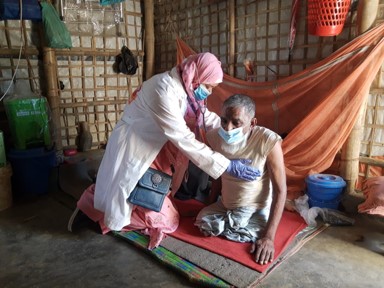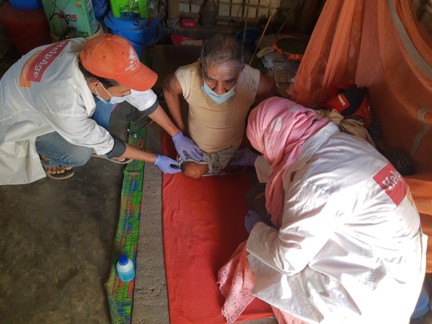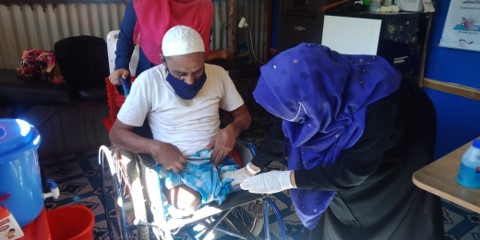Injured and alone in the world’s largest refugee camp – Ali’s story

Age International, along with our partner HelpAge International, has been supporting older Rohingya refugees living in six huge makeshift camps in Cox’s Bazar, Bangladesh. Ali Ahammed, 74, told us the harrowing story of how he was injured and alone in the camps after fleeing violence in Myanmar - until our project team stepped in and changed his life.
Ali Ahammed had been living in a village in Myanmar with his wife, sons and daughters, making a living by farming and selling firewood, when they were forcefully displaced by the Myanmar army. While escaping the violence, Ali was shot in the leg and became separated from his family.
He remembers lying down on the ground with his wounded leg and groaning, crowds running all around him. He was barely able to stand but eventually, someone kindly helped him up and put him on a boat. The boat brought Ali to Teknaf in Bangladesh, where he spent three nights on the streets and two nights in the mosque. In the meantime, the rest of his family were stuck in Myanmar, unable to afford the journey to Bangladesh. They had no communication with Ali and began to think he was dead.
Local people provided Ali with some money and helped him to go to the Cox’s Bazar refugee camps. With the help of some humanitarian organisations, he was able to find his sister-in-law who took him to a hospital in the camp, but he was unable to get proper treatment and eventually he was advised that in order to save his life, the toes of his left foot must be amputated. He agreed, but after the operation, his leg gradually began turning black and necrosed, and he required a further amputation from below the knee.
This part of his life he calls ‘the life in hell’. He still hadn’t found his sons or daughters. With his injuries, he needed a dedicated caregiver, but he had no one to help him manage his condition, get food rations or cook.
Luckily, one of our project workers found him whilst surveying the camps and let the project team and medical officer know of Ali’s situation. When they found him, he had severe necrosis around his amputation, and he required a further amputation. The project team were able to organise the amputation for him and create a comprehensive care plan to help him recover.

Our project team liaised with other humanitarian organisations and were able to find out that Ali’s family were living in another camp and they were finally reunited, although Ali learned that sadly his wife had not made it. The project team assessed his needs and were able to help him get a ration card and provide him with essentials including a wheelchair and warm clothes.
Ali now lives with his daughter, son, daughter-in-law and three grandchildren. The project provides him with medicine, regular health check-ups and counselling and he is visited by a home-based carer. As part of the project’s COVID-19 response, Ali and his family also received masks, hand sanitisers and disinfectant to help them stay safe from the virus. Ali Ahammed said:
"I could never have imagined this new life when I thought I would die without seeing my family, without any healthcare. Finally, I came to know there are still some people and there is still hope. Thank you."

Help us to continue supporting older people around the world
Whether with better healthcare, a secure income or life-saving aid – your gift could help change lives.
COVID-19 Hub
Learn more about our COVID-19 response in the Cox's Bazar refugee camps in Bangladesh.
 Follow us on social media
Follow us on social media
Keep seeing our stories or ask us a question - connect on Facebook and Twitter.
